Key Takeaways
- Unlock Trending Keywords: Explore powerful free tools to discover trending keywords in real-time. Stay ahead of the curve by identifying emerging topics before they appear in traditional research tools.
- Refine Your SEO Strategy: Harness the insights from diverse tools to refine your SEO strategy. Understand user intent, optimize content, and enhance your website’s visibility using comprehensive keyword data.
- Enhance User Engagement: Craft user-centric content by integrating insights from top free tools. Understand your audience’s language, anticipate their needs, and create engaging content that resonates, driving meaningful interactions and long-lasting connections.
In the ever-evolving world of search engine optimization (SEO), keyword research remains a fundamental pillar for driving organic traffic to your website.
Understanding the language and phrases your target audience uses when searching for information, products, or services is crucial for optimizing your website’s visibility and capturing relevant search traffic.
However, conducting comprehensive keyword research can be a daunting task without the right tools and resources.
Fortunately, there are numerous free tools available that can assist you in conducting effective keyword research and unlocking valuable insights.
These tools empower you to uncover relevant keywords, analyze their metrics, and gain a competitive edge in the crowded digital landscape.
In this blog post, we will explore the top free tools for effective keyword research, equipping you with the knowledge and resources to refine your SEO strategy and achieve tangible results.
In this blog post, we will delve into each of these top free keyword research tools, providing an in-depth analysis of their features, functionalities, and techniques for maximizing their effectiveness.
By harnessing the power of these tools, you can uncover valuable keyword opportunities, understand search trends, and refine your content strategy to attract targeted organic traffic.
Stay tuned to learn how you can leverage these tools to achieve SEO success and propel your website to new heights of visibility and engagement.
But, before we venture further, we like to share who we are and what we do.
About AppLabx
From developing a solid marketing plan to creating compelling content, optimizing for search engines, leveraging social media, and utilizing paid advertising, AppLabx offers a comprehensive suite of digital marketing services designed to drive growth and profitability for your business.
AppLabx is well known for helping companies and startups use SEO to drive web traffic to their websites and web apps.
At AppLabx, we understand that no two businesses are alike. That’s why we take a personalized approach to every project, working closely with our clients to understand their unique needs and goals, and developing customized strategies to help them achieve success.
If you need a digital consultation, then send in an inquiry here.
Top 10 Free Tools for Effective Keyword Research
- Google Keyword Planner
- Ahrefs
- Moz
- SEMRush
- Wordstream
- AnswerThePublic
- Google Search Console
- Keyword Surfer
- ChatGPT
- Google Trends
1. Google Keyword Planner
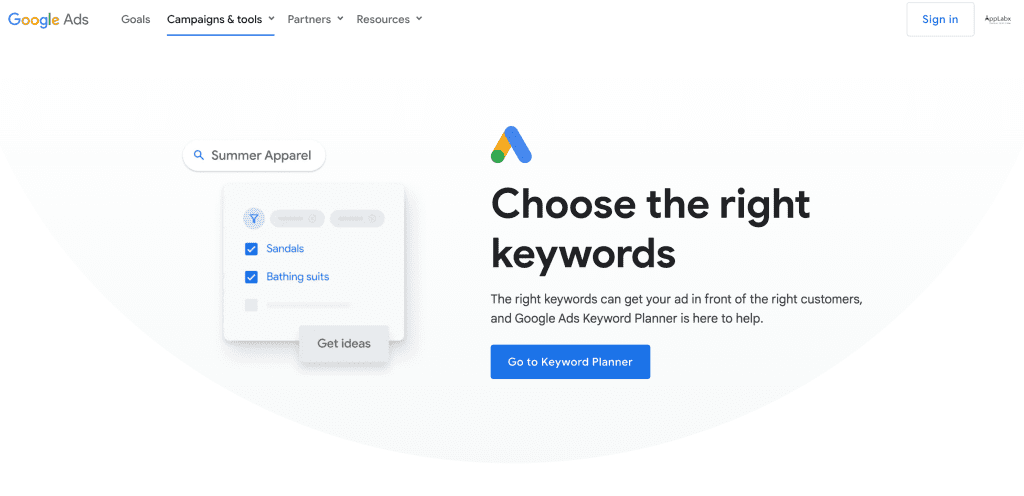
Google Keyword Planner stands as a stalwart in the realm of PPC keyword research, offering unparalleled advantages to marketers and businesses.
One of its most notable strengths is its steadfast commitment to being entirely free, irrespective of your engagement with Google Ads.
This enduring accessibility ensures that users are unencumbered by limitations or the spectre of costly upgrades, providing an invaluable resource for businesses of all sizes.
The tool boasts a multifaceted approach, with two pivotal features that underpin its efficacy.
Firstly, the “Keyword Ideas” functionality aligns with the modus operandi of various tools in its category.
Here, users input a seed term, and in return, the tool generates a plethora of related keywords.
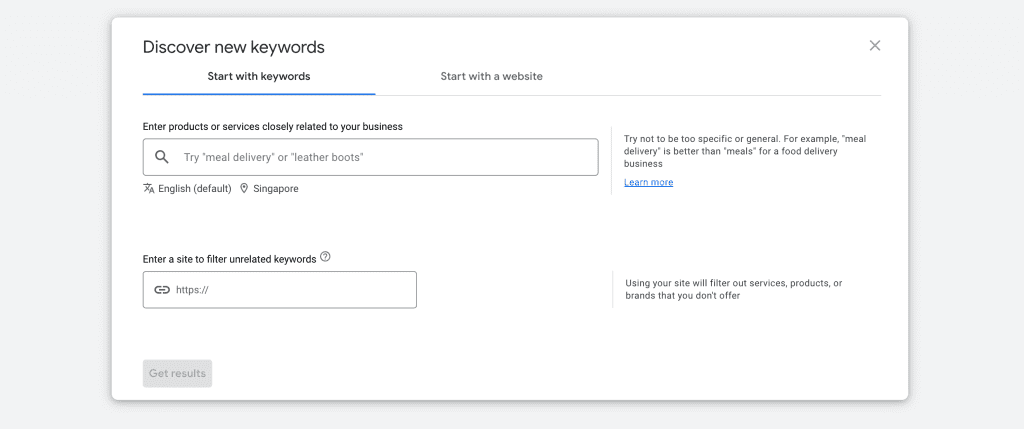
These suggestions are complemented by a comprehensive dataset, including monthly search volume, historical trends, competitive landscape, ad impression share, and bid ranges.
Notably, the granularity of this information allows for nuanced decision-making, empowering businesses to refine their keyword strategies based on factors such as brand relevance, non-brand keywords, and the source website.
The second feature, the “Forecast” functionality, extends its utility to strategic planning within the realm of paid advertising.
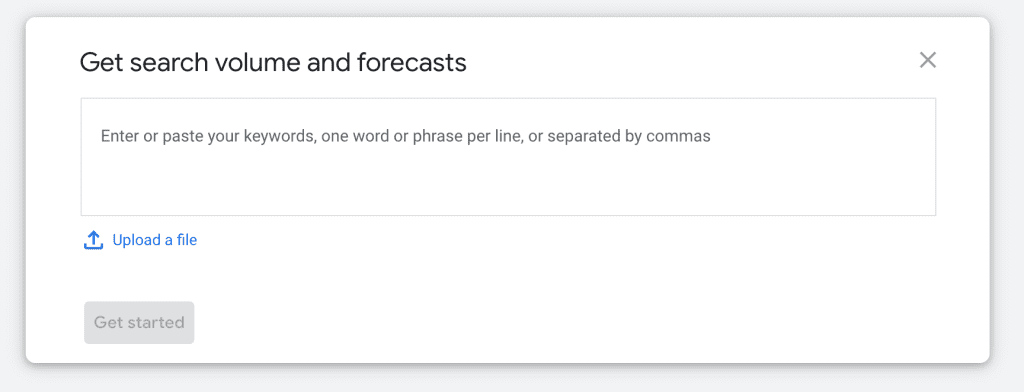
By offering insights into future trends and anticipated search volumes, this feature becomes an invaluable ally for businesses aiming to forecast their paid ad campaigns.
This foresight not only enhances the precision of marketing efforts but also aids in prudent budgeting, enabling businesses to allocate resources judiciously and maximize their returns on investment.
Additionally, Google Keyword Planner serves as a beacon for businesses navigating the intersection of organic and paid strategies.
By illuminating areas where organic rankings could mitigate PPC costs, it empowers businesses to strike a strategic balance between paid and organic visibility, thereby optimizing their expenditure and amplifying their online presence.
While Google Keyword Planner excels in the realm of PPC research, it falls short when it comes to facilitating organic keyword exploration. Businesses seeking to refine their organic strategies might find the tool lacking in robust functionalities tailored to this specific domain.
In essence, Google Keyword Planner emerges as an indispensable asset for businesses delving into the intricacies of PPC keyword research. Its unwavering accessibility, coupled with its advanced features for both exploratory and in-depth research, renders it a cornerstone in the arsenal of digital marketers and businesses striving for online prominence.
2. Ahrefs
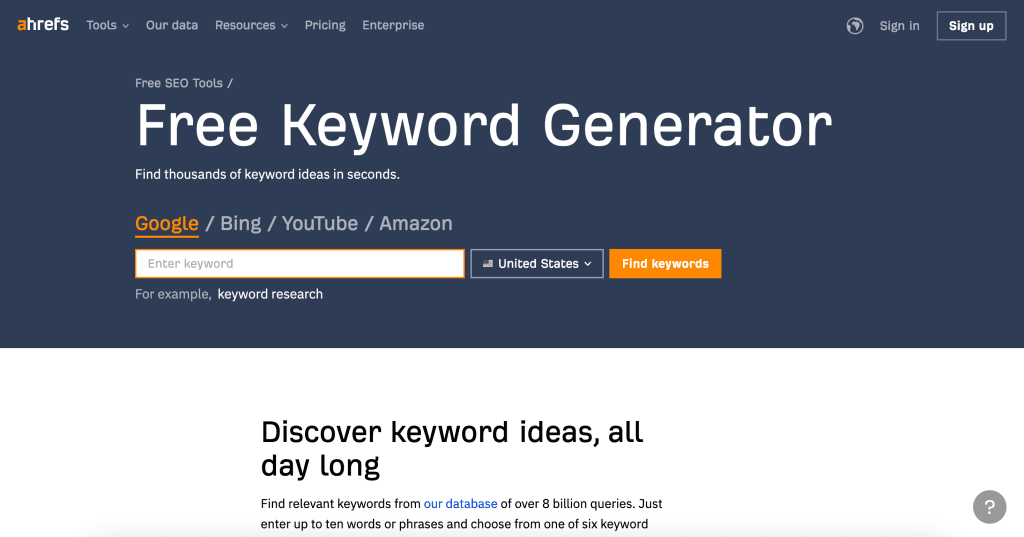
In the realm of SEO tools, Ahrefs emerges as a beacon of versatility and simplicity.
Its array of free tools spans a wide spectrum of SEO applications, making it an invaluable resource for digital strategists and businesses seeking to enhance their online visibility.
One of the notable strengths lies in the comprehensiveness of Ahrefs’ free offerings. Despite the limitations of the free version, it provides access to a range of essential tools, including a Free Keyword Generator, Keyword Difficulty Checker, and Keyword Rank Checker.
What sets Ahrefs apart is its inclusive approach to keyword research, extending its analysis not only to conventional search engines but also to platforms like YouTube, Amazon, and Bing.
This unique feature caters to the diverse needs of businesses operating in various online domains, allowing for tailored strategies in different online spaces.
The Free Keyword Generator, a cornerstone of Ahrefs’ free suite, offers a treasure trove of up to 150 keyword ideas at no cost.
This includes a blend of 100 phrase-match keywords and 50 question-based keywords.
Crucially, each suggestion is augmented with vital data, such as monthly search volume and keyword difficulty for the top 10 results.
The Keyword Difficulty Checker supplements this by providing a nuanced analysis, including a difficulty score, the estimated number of backlinks required for ranking, and a comprehensive SERP analysis for the top 10 results.
While these tools may not match the depth of data accessible through paid accounts, their breadth of coverage remains a testament to their efficacy.
Ahrefs’ free suite excels not just in keyword research but also in pivotal areas of SEO operations.
From link building and website audits to monitoring rankings and traffic, these tools collectively form a robust toolkit for basic SEO endeavours.
This holistic approach ensures that businesses, even with limited resources, can engage in multifaceted SEO strategies, bolstering their online presence and competitiveness.
Furthermore, Ahrefs offers a seamless transition path for businesses whose budgets evolve.
Should the need for more advanced features arise, businesses can effortlessly upgrade to a premium toolset that stands shoulder-to-shoulder with the finest offerings in the market.
This scalability ensures that businesses can adapt their SEO strategies in alignment with their growth and evolving requirements.
3. Moz
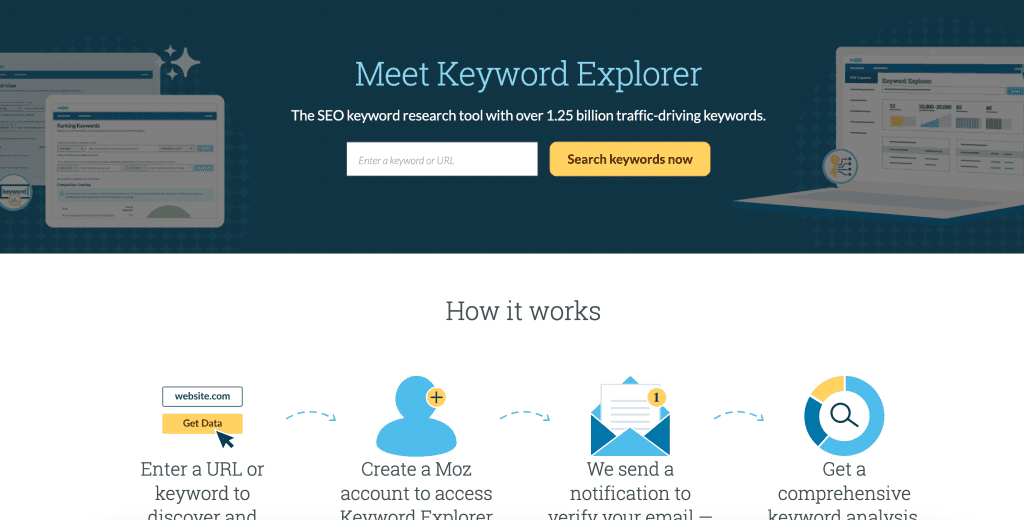
In the realm of SEO tools, Moz stands out for its user-friendly approach to data presentation.
Unlike some of its counterparts, Moz opts for a more approachable style, making intricate SEO metrics accessible even to those without extensive experience in the field.
One of its standout features, the “Priority” score, revolutionizes keyword research.
By distilling complex data into a clear indicator of a keyword’s worth, Moz empowers users to focus their efforts on the most valuable keywords, streamlining the decision-making process significantly.
Moz’s expansive suite of tools, available for free, amplifies its appeal.
Despite not offering the exhaustive data sets found in some high-end SEO tools, Moz’s strategy of prioritizing essential metrics over overwhelming statistics is a boon.
This approach ensures that users are equipped with the necessary insights without being inundated with unnecessary complexities.
For individuals not deeply entrenched in the nuances of search marketing, this simplicity proves invaluable.
A standout tool in Moz’s arsenal is the Keyword Explorer.
Here, users can delve into any keyword of their choice and uncover vital metrics such as monthly search volume, difficulty, and organic clickthrough rate (CTR).
The tool goes a step further by providing an in-depth analysis of current results ranking for the keyword and suggesting similar keywords, fostering a comprehensive understanding of the keyword landscape.
The crowning jewel of Moz’s Keyword Explorer is the ingenious “Priority” score.
This metric simplifies the often intricate process of keyword research.
By amalgamating the keyword’s volume, organic CTR, and difficulty with the user’s personalized “My Score”—a metric the user sets based on their business’s unique needs—the tool offers a clear verdict on a keyword’s viability for pursuit.
This tailored approach ensures that businesses can align their keyword strategies precisely with their objectives and expertise.
Furthermore, the Competitive Research tool within Moz’s suite offers a distinct advantage.
Through the innovative Keyword Gap feature, users can discern the keywords their competitors rank for but they do not.
This invaluable insight provides a strategic edge, enabling businesses to identify untapped keyword opportunities and refine their SEO strategies for maximum impact.
While Moz’s approach is user-friendly, it does come with limitations.
The platform offers less data than some of its more comprehensive counterparts, potentially limiting the depth of analysis for advanced users.
Additionally, the free plan imposes restrictions, allowing only 10 queries per tool per month.
This limitation might prove restrictive for businesses with extensive keyword research needs, necessitating a consideration of higher-tier plans for more comprehensive usage.
Despite these constraints, Moz’s emphasis on simplicity and essential metrics continues to make it a compelling choice for businesses seeking a streamlined and effective SEO toolkit.
4. SEMRush
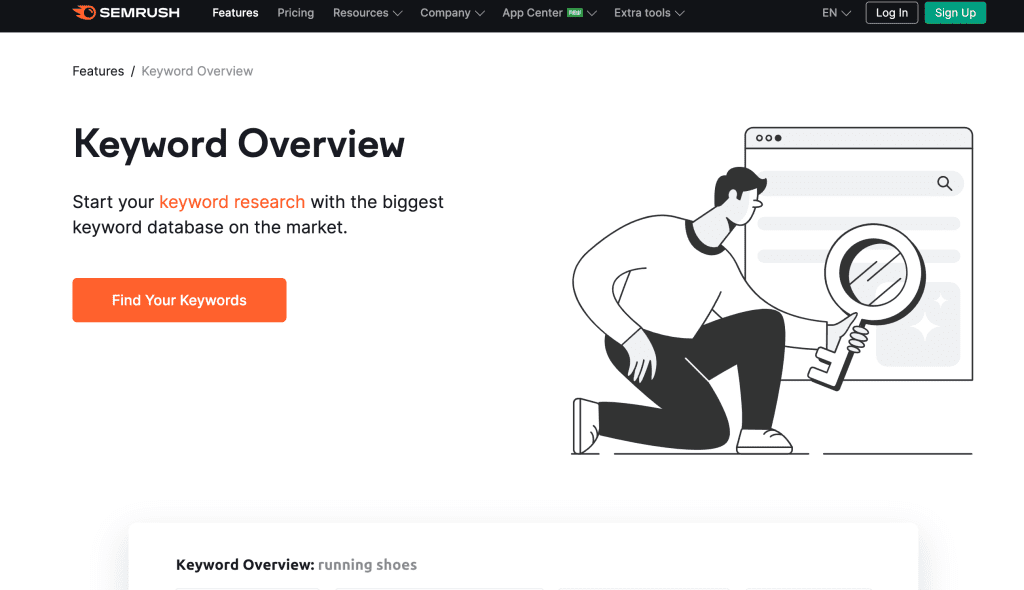
Semrush stands as a paragon of advanced keyword research, offering a wealth of granular data that caters to the needs of seasoned digital marketers and businesses aiming for nuanced insights.
One of its defining strengths lies in the sheer depth of keyword data it provides, allowing users to delve into intricate details such as SERP features, including featured snippets, reviews, site links, and image packs.
This granularity sets Semrush apart, enabling users to conduct detailed analyses of current results and gain a profound understanding of the competitive landscape.
The diverse toolkit offered by Semrush is a testament to its comprehensive approach.
From the fundamental Keyword Overview to the exploratory prowess of the Keyword Magic Tool, Semrush covers a broad spectrum of keyword research needs.
The inclusion of tools like Keyword Manager and position tracking, competitive Keyword Gap analysis, and Organic Traffic Insights further enriches its arsenal, ensuring that users have access to a multifaceted set of instruments tailored to diverse requirements.
Semrush’s ingenuity extends to solving the enigma of “not provided” keywords.
By integrating with Google Analytics or Search Console accounts, its Organic Traffic Insights tool unveils these elusive keywords, providing businesses with previously unavailable insights into user behavior and search patterns.
A standout feature of Semrush is its SEO Content Template tool.
This innovative tool automates the content optimization process by generating real-time content briefs and evaluating content for readability, originality, tone of voice, and SEO factors.
It employs a visual grading system, represented by a bullseye graphic, aiding writers in striking the perfect balance.
Additionally, the tool actively guides users by visually tracking SEO recommendations, ensuring the incorporation of target and related keywords, relevant links, and images.
Despite its advanced capabilities, Semrush might prove overwhelming for users less experienced in the nuances of keyword research.
Its extensive array of features and data points could potentially pose a challenge for those unfamiliar with the intricacies of the digital marketing landscape.
Furthermore, while Semrush offers a plethora of functionalities, its premium upgrades come at a premium cost. It stands as one of the more expensive options in the market, potentially posing a budgetary challenge for businesses with limited financial resources.
However, Semrush does provide the option to use its services for free at lower volumes, allowing businesses to explore its capabilities before committing to a paid plan.
This flexibility caters to businesses at different stages of their growth journey, ensuring that they can align their investment with their evolving needs.
5. Wordstream
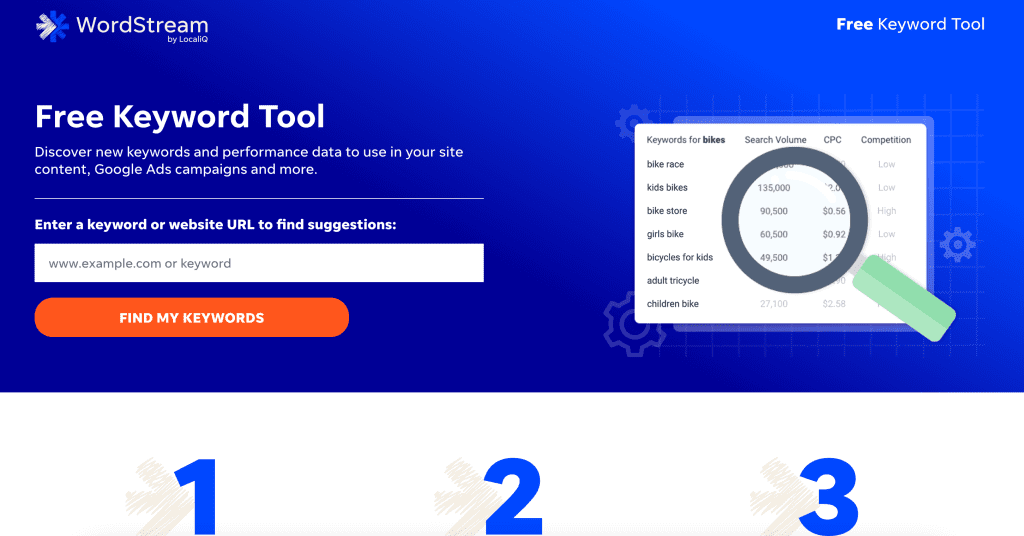
In the expansive landscape of digital marketing, the importance of strategic keyword research cannot be overstated. Wordstream, armed with an extensive database comprising a staggering trillion keywords sourced directly from Google search data, emerges as a potent ally for businesses striving for online prominence.
This advanced keyword tool serves as a beacon of simplicity and depth, empowering businesses to unravel the intricacies of effective keyword selection.
At the core of Wordstream’s prowess lies its user-friendly interface, designed to demystify the often complex realm of keyword research. Utilizing this tool is a streamlined process: input your business’ URL or desired keyword, with the option to enhance precision by adding your location and industry.
With a simple click on ‘Find My Keywords,’ a treasure trove of meticulously curated keywords tailored to your business unveils before you.
Unlike many free tools that limit the scope of results, Wordstream’s keyword tool offers a remarkable breadth of relevant keywords.
Upon downloading the keyword list in CSV format, users gain access to hundreds of pertinent keywords, ensuring a comprehensive understanding of the digital landscape pertinent to their industry.
One of Wordstream’s standout features is its ability to provide essential metrics for both Google and Bing search results.
From competition levels to Cost Per Click (CPC) and search volume, this tool offers a panoramic view of the keyword landscape, enabling businesses to make informed decisions grounded in data-driven insights.
For businesses eager to gain a competitive edge, Wordstream’s keyword tool offers a compelling solution.
By inputting a competitor’s URL, users unlock a wealth of contextual keyword suggestions.
This functionality not only aids in competitor analysis but also provides invaluable insights into how your website fares in comparison to others within your industry.
What truly elevates the Wordstream keyword tool above its counterparts is its unique filtering mechanism.
Businesses can tailor their results by industry type, ensuring that the displayed keywords align meticulously with the specific nuances of their chosen field.
This precision allows businesses to refine their keyword strategies, focusing solely on keywords relevant to their industry and target audience.
In essence, Wordstream’s advanced keyword tool stands as a comprehensive and intuitive resource, offering businesses an invaluable toolkit to navigate the complex terrain of keyword research.
With its wealth of relevant keywords, in-depth metrics, and industry-specific filtering, this tool becomes an indispensable asset for businesses aspiring to carve a distinct digital presence in their respective sectors.
6. AnswerThePublic

In the dynamic realm of SEO, understanding the language of genuine search queries is paramount.
AnswerThePublic, a stellar free keyword research tool, stands as a beacon in this endeavor, offering an up-to-the-minute compilation of phrases and questions that real people are actively searching for.
This tool serves as a linchpin for digital marketers, providing a strategic gateway to uncover effective long-tail keywords essential for a robust content marketing strategy.
The process is remarkably straightforward: input a keyword, and AnswerThePublic unveils a comprehensive list of suggested keywords, each intricately phrased to capture diverse user intents.
What sets this tool apart is its intuitive approach to keyword exploration.
Beyond mere keywords, AnswerThePublic delves into questions, prepositions, and comparisons related to the chosen keyword.
The results are meticulously laid out in a visually captivating format, facilitating effortless identification of the most pertinent keywords to integrate into content strategies.
AnswerThePublic goes the extra mile by offering an alphabetical arrangement of results.
Moreover, the convenience of downloading the entire dataset as a CSV file ensures readiness for deployment whenever the need arises.
This flexibility is particularly advantageous for seamless integration into platforms like Google Ads, allowing marketers to optimize their campaigns with unparalleled ease and precision.
For marketers focusing on user-centric content strategies, AnswerThePublic emerges as an indispensable tool.
Its ability to decode the intricacies of user queries, especially in the era of rising voice searches, adds an additional layer of significance.
By comprehending how people phrase their questions or searches during voice interactions, businesses can tailor their content to align seamlessly with user expectations, thereby enhancing user engagement and satisfaction.
In summary, AnswerThePublic stands as an invaluable asset in the digital marketer’s toolkit.
Its ability to unravel the nuances of user queries and its user-friendly interface make it an essential companion for those aiming to craft content that resonates deeply with their audience, leading to enhanced online visibility and lasting customer connections.
7. Google Search Console
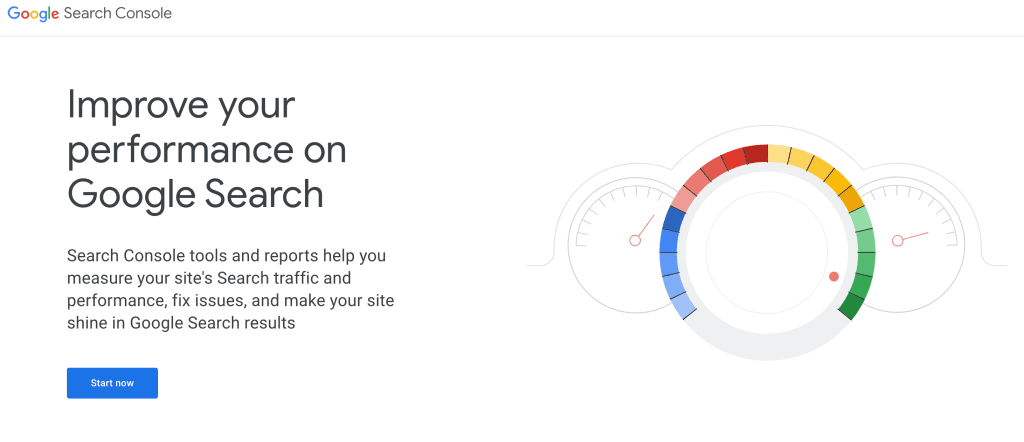
In the intricate world of digital marketing, the prowess of Google Search Console often remains underestimated. Yet, this tool harbors invaluable insights for those astute enough to recognize its potential.
By seamlessly integrating with Google Analytics, Google Search Console transcends the role of a mere monitoring tool, becoming a powerhouse of data that fuels informed content marketing and SEO strategies.
At its core, Google Search Console acts as a vigilant guardian, enabling site owners to monitor, maintain, and troubleshoot their website’s presence in Google Search results.
When utilized in conjunction with Google Analytics, this dynamic duo offers a profound understanding of a website’s search performance.
What’s even more enticing is the fact that these robust tools are freely provided by Google, serving as indispensable assets for the discerning digital marketer.
Google Search Console offers a wealth of essential search metrics, providing a panoramic view of on-site content performance.
Through metrics such as average Google positions, impressions, and Click-Through Rates (CTRs), site owners gain actionable insights into the frequency of their site’s appearance in searches.
Moreover, it illuminates the specific search terms for which the site is showcased and highlights the usage frequency of keywords pertinent to the business.
This depth of information is not just a means of monitoring; it serves as a strategic compass, guiding marketers on where to channel their efforts and resources.
The Search Queries report within Google Search Console emerges as a focal point of this strategic insight.
This report meticulously details the search terms utilized by organic website visitors.
Analyzing these queries becomes a potent tool for identifying underperforming on-site content, presenting opportunities for valuable updates.
Simultaneously, this data unveils untapped keyword opportunities, paving the way for the creation of new, high-impact content. In essence, Google Search Console transcends its role as a mere observer, becoming an active participant in shaping SEO endeavors.
In conclusion, recognizing and harnessing the capabilities of Google Search Console is not just a tactical advantage; it’s a strategic imperative.
For businesses seeking to optimize their digital footprint, this tool stands as an indispensable ally, offering nuanced insights that drive impactful content strategies, enhance search performance, and, ultimately, elevate online visibility and user engagement.
8. Keyword Surfer
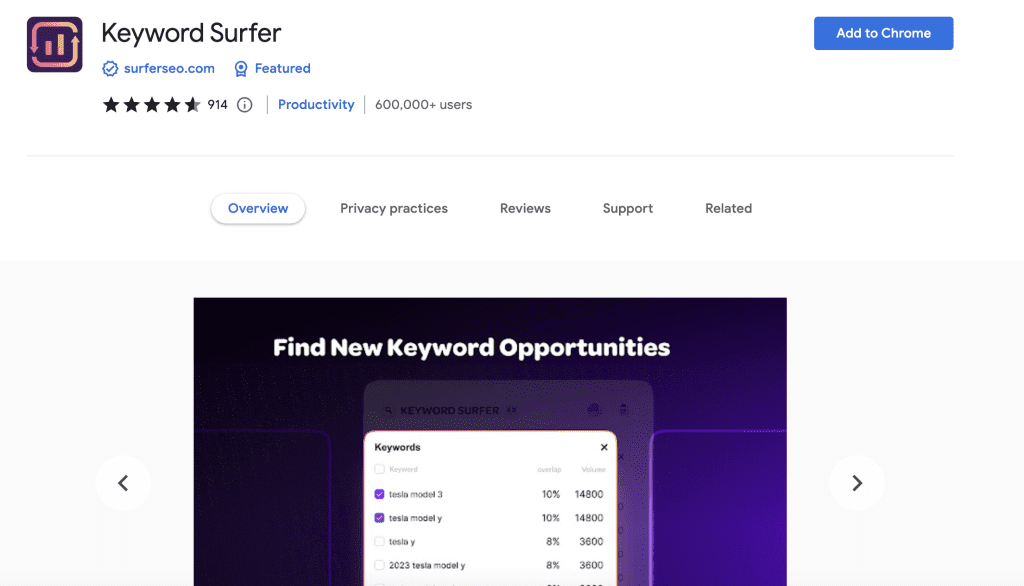
In the vast landscape of digital marketing, the significance of adept keyword research cannot be overstated.
Amid the plethora of tools available, Keyword Surfer emerges as a swift and accessible solution, seamlessly integrated into the familiar terrain of Google Chrome and Firefox.
This browser extension fundamentally alters how users interact with Google, transforming it into a potent tool for keyword discovery.
Upon installation, Keyword Surfer seamlessly integrates with Google’s search bar.
Enter your desired keyword, and a wealth of information unfolds before you.
This includes a curated list of similar keyword suggestions, search volumes, on-page data, and visibility metrics.
Such comprehensive insights provide a nuanced understanding of the keyword landscape, empowering users to make strategic decisions regarding their content marketing or SEO campaigns.
One of the extension’s standout features is its ability to unveil the estimated monthly traffic for the domains featured in the search results.
This data serves as a valuable benchmark, enabling users to gauge the performance of web pages currently ranking for their chosen keywords.
Additionally, Keyword Surfer provides insights into the total number of on-page words and keywords, offering a holistic perspective on content structure and relevance.
What sets Keyword Surfer apart is its remarkable convenience.
Users can seamlessly obtain relevant keywords without navigating away from their current browser window or opening additional programs.
This efficiency streamlines the keyword research process, allowing marketers to focus their energy on strategic planning rather than cumbersome technicalities.
In essence, Keyword Surfer represents a paradigm shift in keyword research. Its ability to swiftly and comprehensively provide vital metrics and suggestions within the familiar interface of Google Chrome and Firefox makes it a powerful asset for businesses aiming to enhance their SEO strategies or content marketing campaigns.
Its user-friendly approach ensures that even those new to keyword research can seamlessly integrate this tool into their digital marketing arsenal, empowering them to make data-driven decisions and bolster their online presence effectively.
9. ChatGPT
Within the expansive realm of digital marketing, precision in keyword selection is often the linchpin for successful campaigns.
OpenAI’s ChatGPT, while primarily renowned as a chatbot, offers a unique utility in the domain of keyword research.
Although not designed comprehensively for keyword research, it emerges as a valuable tool specifically for generating seed keyword ideas.
ChatGPT, powered by OpenAI’s advanced language model, proves its mettle in brainstorming sessions for initial keyword ideas.
Users can engage with ChatGPT in natural language conversations, introducing specific topics or industry niches.
Through these interactions, ChatGPT can suggest relevant seed keywords, providing a creative springboard for further research.
While ChatGPT isn’t exhaustive in its data analysis, its strength lies in its ability to generate unique and contextually relevant keyword ideas. By using ChatGPT, marketers can:
**1. Explore Niche Terminology: ChatGPT can assist in uncovering industry-specific jargon, regional language nuances, or trending phrases within a particular niche. This understanding is invaluable for targeting specific audience segments.
**2. Content Ideation: Engaging with ChatGPT can spark creative content ideas. By discussing themes, trends, or topics related to the business, marketers can extract potential keywords from the conversational suggestions.
**3. Long-Tail Keyword Exploration: ChatGPT can delve into long-tail keyword suggestions, providing insights into user queries and specific phrases. Long-tail keywords, often more specific and less competitive, can be potent assets in SEO strategies.
**4. Enhanced User Intent Understanding: Through conversational queries, marketers can gain insights into user intent. Understanding what users are looking for can aid in tailoring content to meet those needs effectively.
Once seed keywords are obtained from ChatGPT, marketers can validate these ideas using dedicated keyword research tools.
By cross-referencing ChatGPT-generated keywords with search volume data, competition analysis, and relevancy metrics from tools like Google Keyword Planner or SEMrush, marketers can refine their keyword lists for SEO campaigns.
In summary, while ChatGPT may not replace comprehensive keyword research tools, its unique capability to generate seed keyword ideas and offer valuable insights into user intent makes it a valuable addition to the digital marketer’s toolkit.
When integrated judiciously with other research methodologies, ChatGPT’s suggestions can significantly enrich the depth and diversity of keyword strategies, enabling businesses to reach their target audiences more effectively in the competitive digital landscape.
10. Google Trends

In the ever-evolving landscape of digital marketing, staying ahead of the curve is pivotal.
Google Trends, a formidable tool in the hands of discerning marketers, offers a unique perspective into the shifting tides of online search trends.
Unlike static keyword research tools, Google Trends dynamically visualizes the relative search popularity of a keyword over time, painting a vivid picture of its trajectory in the digital sphere.
Google Trends not only provides historical data but also reveals related rising and breakout searches.
This nuanced approach enables marketers to identify not just popular keywords but also emerging trends.
By inputting a keyword, such as “ai content,” into Google Trends, users can witness a surge in interest reflected as a significant spike.
Delving deeper, the “Related queries” section becomes a goldmine of information.
Here, users encounter keywords on the rise, such as “ai content creator,” “open ai,” and “chatgpt.” These terms represent not just current interests but also potential future trends.
What sets Google Trends apart is its agility; it often reveals trending keywords before they surface in conventional keyword research tools.
This timely insight offers a strategic advantage, allowing businesses to explore newly popular topics before their competitors catch wind of them.
- Anticipating Trends: Google Trends acts as a crystal ball, offering glimpses into what captures the online audience’s attention. By identifying rising and breakout searches, marketers can predict upcoming trends, enabling them to tailor their content and marketing strategies accordingly.
- Timely Content Creation: Armed with knowledge from Google Trends, marketers can craft timely and relevant content around emerging topics. This not only enhances brand relevance but also positions the business as an authoritative voice in trending conversations.
- Competitive Edge: The real-time nature of Google Trends provides a competitive edge. By capitalizing on emerging trends before competitors do, businesses can seize untapped market opportunities, driving engagement and staying at the forefront of their industry.
In essence, Google Trends functions as more than just a tool; it’s a strategic compass.
By understanding the intricate nuances of online search trends, businesses can navigate the digital landscape with precision.
Google Trends serves as a beacon, illuminating the path to timely, data-driven decision-making, ensuring that businesses not only keep pace with evolving trends but also proactively shape the conversations of tomorrow.
Conclusion
In the vast expanse of the digital realm, where every click and keystroke matters, mastering the art of keyword research is akin to discovering the key to a treasure trove of online visibility and success.
In our exploration of the “Top 10 Free Tools for Effective Keyword Research,” we have delved into an arsenal of invaluable resources that empower digital marketers and businesses to uncover the language of their audience, ensuring that their online endeavors resonate deeply in the ever-competitive landscape of the internet.
Google Keyword Planner emerges as the cornerstone, providing a robust foundation upon which intricate SEO strategies are built.
Its ability to offer insights into search volume, competition, and trends sets the stage for comprehensive keyword analysis.
By dissecting the nuances of user queries, businesses can align their content precisely with user intent, ensuring that every piece of content serves a purpose and resonates meaningfully with their target audience.
Ahrefs, with its comprehensive suite of free tools, stands as a testament to versatility.
Its diverse offerings, from keyword generators to difficulty checkers, empower businesses with multifaceted insights.
By amalgamating data from various platforms, including YouTube and Amazon, Ahrefs transcends the boundaries of traditional keyword research.
The depth and breadth of its free tools enable businesses to explore a spectrum of SEO activities, ensuring that no stone is left unturned in their quest for online prominence.
Moz, with its user-friendly interface and essential metrics, strikes a harmonious balance between simplicity and precision.
The “Priority” score, a unique feature, distills complex data into a clear indicator of a keyword’s worth, enabling businesses to channel their efforts effectively.
Through the Keyword Explorer tool, Moz provides not just insights but actionable intelligence, guiding businesses towards the most valuable keywords and content opportunities.
Semrush, a powerhouse in the realm of SEO tools, offers granularity that sets it apart.
Its ability to decode intricate details, such as SERP features and on-page analysis, paints a vivid picture of the competitive landscape.
By integrating with Google Analytics, Semrush pierces through the veil of “not provided” keywords, shedding light on user behavior and preferences.
Its SEO Content Template tool ensures that content creation is not just creative but also data-informed, striking the delicate balance between art and science.
AnswerThePublic emerges as a beacon for understanding the language of genuine user queries.
By compiling real-time phrases and questions, it offers businesses a unique glimpse into the minds of their audience.
Its ability to decipher not just keywords but user intent ensures that businesses can craft content that answers real questions and addresses real needs, fostering genuine connections with their audience.
Wordstream, with its simplicity and speed, stands as a testament to the efficiency of focused tools.
Its ability to swiftly generate relevant keywords, tailored to specific industries, ensures that businesses can jump-start their SEO endeavors without cumbersome complexities.
By effortlessly integrating these keywords into their marketing strategies, businesses can save time and resources, redirecting their energy towards crafting impactful content and engaging with their audience.
Keyword Surfer, as a browser extension, seamlessly integrates with everyday browsing habits.
Its ability to transform the Google search bar into a keyword discovery tool ensures that users can explore new avenues without disrupting their workflow.
By effortlessly suggesting keywords and providing real-time insights, it bridges the gap between casual browsing and strategic SEO planning.
In this odyssey through the “Top 10 Free Tools for Effective Keyword Research,” businesses and digital marketers are equipped with a formidable arsenal.
These tools, each with its unique strengths, offer not just insights but actionable intelligence.
They provide a panoramic view of user behavior, enabling businesses to anticipate needs, answer queries, and craft content that goes beyond keywords; it speaks to the very soul of their audience.
In the digital arena, where every word and every click carries immense weight, these tools serve as the guiding stars, illuminating the path to online prominence.
They are not just tools; they are the architects of meaningful online interactions, the catalysts for profound connections, and the enablers of enduring digital legacies.
Armed with these insights, businesses are not merely spectators in the digital revolution; they are active participants, shaping the narrative, and crafting experiences that resonate deeply with their audience.
As they harness the power of these tools, businesses transcend mere visibility; they become forces of influence, champions of relevance, and architects of a digital landscape where every keyword is not just a search query but a bridge to a lasting relationship.
In the ever-evolving tapestry of the internet, where trends shift, algorithms change, and user behaviors transform, these tools remain steadfast companions, ensuring that businesses are not just adaptive but proactive.
They are the linchpins of innovation, the guardians of authenticity, and the keys to the doors of online success.
Embrace these tools not as mere instruments in a toolkit, but as allies in the pursuit of digital greatness.
With every keyword researched, every trend anticipated, and every user need addressed, businesses inch closer to a digital utopia—a place where their brand echoes in the minds of their audience, where their content resonates in the hearts of their readers, and where their online presence stands as a testament to not just their offerings but their understanding of their audience’s dreams, desires, and aspirations.
The journey through the world of keyword research doesn’t end here; it’s a perpetual odyssey, an ongoing exploration where businesses continuously refine their strategies, adapt to new technologies, and listen keenly to the whispers of their audience.
Armed with these top free tools, this odyssey becomes not just a challenge but an adventure—an adventure where businesses, armed with knowledge, embark on a quest to conquer not just search engine rankings but the hearts and minds of their audience.
In the grand tapestry of digital marketing, where strategies ebb and flow, one thing remains constant: the power of keywords.
They are not just strings of characters; they are the conduits of communication, the vessels of intent, and the bridges that connect businesses with their audience.
As businesses harness the insights from these top free tools, they are not just optimizing for search engines; they are optimizing for the human experience.
They are crafting content that speaks volumes, resonates deeply, and transforms casual visitors into loyal patrons. With every keyword meticulously chosen, businesses are not merely reaching out; they are touching lives, sparking curiosity, and inspiring action.
In conclusion, the world of keyword research is not just a realm of data and algorithms; it’s a realm of human stories, aspirations, and dreams.
These top free tools are not just instruments; they are storytellers, unraveling the tales of the digital universe. As businesses wield these tools with wisdom and creativity, they become not just marketers; they become custodians of the digital narrative, shaping a world where every search is not just a query but an opportunity—a chance to connect, to inspire, and to leave an indelible mark on the ever-expanding canvas of the internet.
If you are looking for a top-class digital marketer, then book a free consultation slot here.
If you are looking to hire a full-time digital marketer, then post 1 job free at 9cv9 Job Portal here.
If you find this article useful, why not share it with your friends and business partners, and also leave a nice comment below?
We, at the AppLabx Research Team, strive to bring the latest and most meaningful data, guides, and statistics to your doorstep.
To get access to top-quality guides, click over to the AppLabx Blog.
































